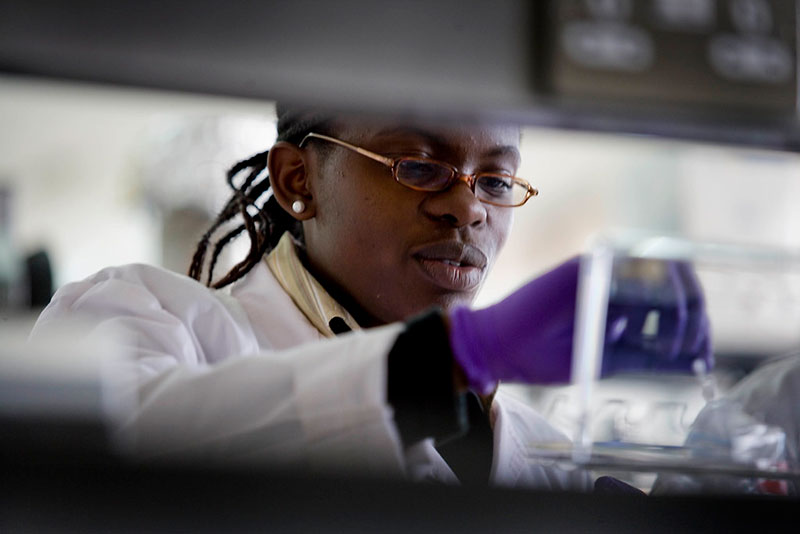New study maps progress of UK-Africa collaboration in tackling antimicrobial resistance in Kenya, Uganda and Tanzania
A new study, undertaken by Prospect IP on behalf of The Bloomsbury SET, has identified some of the key problems surrounding antimicrobial resistance (AMR) across certain parts of Africa, highlighting the need for an interdisciplinary and holistic approach to the threat of AMR in these areas.

"Africa Food Security Research 6" by DFAT photo library is licensed under CC BY 2.0
AMR occurs when microorganisms (like bacteria, viruses, and parasites) develop or change when they are exposed to antimicrobial drugs. AMR is a serious threat to global health, as it can impair the ability of healthcare practitioners to treat common infectious diseases. Aside from the health risk created by resistant bacteria, AMR is also recognised as a significant threat to the world economy.
The “East Africa Case Study: UK-Africa collaborations in combatting Antimicrobial Resistance (AMR)” explores specific AMR issues and challenges in low and middle-income countries, looking at the status of AMR management in Kenya, Uganda and Tanzania. It compares their progress at a national level, in line with the WHO Global Action Plan.
The emergence and spread of infectious diseases depend on complex interactions between humans and animals, their relationship with the environment and socio-economic factors. Knowledge gaps and lack of awareness of these interconnections contribute to the scale of the problem. The inappropriate use of drugs to tackle infectious diseases has led to the increasing burden of AMR which now threatens to undermine previously effective control measures. Low- and middle-income countries are at higher risk of AMR due to the high incidence of infectious diseases and factors such as poor sanitation and contaminated water, limited access to antibiotics, weak health systems and underdeveloped antibiotic stewardship.
Pandemic restrictions limited the opportunities for focus group activities. Nonetheless, by using a combination of interviews and questionnaires, insights were obtained from key stakeholders in AMR management in 11 UK academic institutions and researchers, policymakers and funders in East Africa.
The study identified the need to build capability in LMIC in areas such as AMR awareness, stewardship programmes, socio-economic impact, communication and stakeholder engagement. These findings align with the AMR Funders’ Forum ‘Research Capacity and Skills Review’, published in 2018. Adoption of technological solutions for infectious diseases and AMR will also require a different set of skills, data integration, more effective communication and interdisciplinary approaches with greater involvement of the many different stakeholders.
Professor Claire Heffernan, Director of the London International Development Centre (LIDC) and Professor of International Development at The Royal Veterinary College, said:
“This report is both relevant and timely as we consider the global impact of infectious disease and antimicrobial resistance, following the events of 2020. By exploring knowledge exchange activities in the East Africa region, it provides useful insight to the development of future initiatives, and outlines pathways and pipelines for further research and collaboration in this space.”
The East Africa Case Study provides informative appendices that serve as a directory of 28 collaborative projects highlighting the key players and partners in the UK and Africa, and funding provided by schemes such as the Fleming Fund, a £265 million UK aid programme supporting 24 countries across Africa and Asia to tackle AMR. This is part of a major funding initiative from UK Government departments described in the UKCDR’s report on ‘Antimicrobial Resistance in International Development: UK Research Funding Landscape’, published in 2019.
With Government funding for international development now under review, the East Africa Case Study is timely in highlighting the ongoing priorities and future needs.
Notes to Editors
For more information please contact:
- Jasmin De Vivo (Jasmin.DeVivo@plmr.co.uk or rvc@plmr.co.uk
- Press Line: 0800 368 9520
Reports:
EAST AFRICA CASE STUDY UK – Africa collaborations in combatting Antimicrobial Resistance (AMR)
AMR Funders Forum Research Capacity and Skills Review (2018) https://mrc.ukri.org/documents/pdf/amr-research-capacity-and-skills-review-2018/
UKCDR - Antimicrobial Resistance in International Development: UK Research Funding Landscape (2019) https://www.ukcdr.org.uk/resource/antimicrobial-resistance-in-international-development/
About the Bloomsbury SET:
Starting in April 2018, this £5-million translational research programme led by The Royal Veterinary College (RVC) and funded by Research England’s Connecting Capability Fund, has focused on the development of new vaccines and diagnostic tools, and addressing innovative approaches for data analysis and public health. For more information, please see: https://bloomsburyset.org.uk/
About the RVC
- The Royal Veterinary College (RVC) is the UK's largest and longest established independent veterinary school and is a Member Institution of the University of London. It was the first in the world to hold full accreditation from AVMA, EAEVE, RCVS and AVBC.
- The RVC is the top veterinary school in the UK and Europe, and ranked as the world’s second highest veterinary school in the QS World University Rankings by subject, 2020.
- The RVC offers undergraduate and postgraduate programmes in veterinary medicine, veterinary nursing and biological sciences.
- In 2017, the RVC received a Gold award from the Teaching Excellence Framework (TEF) – the highest rating a university can receive.
- A research led institution with 79% of its research rated as internationally excellent or world class in the Research Excellence Framework 2014.
- The RVC provides animal owners and the veterinary profession with access to expert veterinary care and advice through its teaching hospitals and first opinion practices in London and Hertfordshire.
